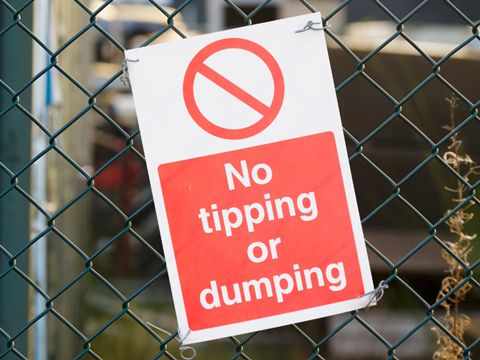
According to an Environment Agency survey, 20% of waste is illegally managed on average, resulting in extra clean-up costs for businesses – yet only 27% of all waste crimes are ever reported.
The Environment Agency defines waste crime as dumping or burning waste, exporting it illegally, incorrectly describing waste to avoid landfill tax or management obligations, and/or operating illegal waste sites. Illegal waste management comes at the financial expense of legitimate waste management businesses, but also harms local communities and the environment.
To gain insight into the nature, scale, and prevention of waste crime, the National Waste Crime Survey addresses farmers, landowners, service providers, and members of the waste industry, giving them an anonymous online platform to share their experiences.
This year’s results suggest that, on average, 20% of all waste may be illegally managed. This outcome has reportedly harmed businesses as cleaning the waste drives up costs – but only 27% of all waste crimes are reported, despite incidents slightly increasing since previous years.
While fewer respondents believe that waste crime has increased over the past twelve months compared to years prior, this is not the case for fly tipping, which more respondents believe has increased this year.
Additionally, few respondents believed that the Environment Agency has the right resources to effectively deter waste crime.
“These results are alarming and highlight that the UK continues to be plagued by rogue waste operators who cause severe environmental and economic harm to local communities,” said David Gudgeon, head of External Affairs at Reconomy Connect. “Waste crime is estimated to cost the UK economy £1 billion annually, underlining the scale of the problem and the urgent need for stronger action.
“The government’s recently announced crackdown on cowboy waste operators by giving councils powers to seize and destroy vehicles used by waste criminals and the introduction of the Digital Waste Tracking system in October 2026, which will monitor waste from households, businesses and industry, are important steps forward. However, these measures alone are not enough.
“To truly tackle the root of the problem, there must be a much greater focus on transitioning to a circular economy. Presently, too few materials are making their way back into the economy with most being lost to incineration or landfill.
“Closing circularity gaps by doubling down on recycling, reuse and resource preservation is the most effective way to protect local environments, boost economic resilience and future-proof businesses.”
According to the National Waste Crime Survey for 2022/23, 18% of waste was managed illegally, and 443 new illegal waste sites were identified; these findings were linked to the 18.4% landfill tax gap. We covered the outlook on England’s recycling and waste management in a previous edition of the Brief.
In other news, Reconomy launched a regional setup, Reconomy Nordics, earlier this year. This data-driven solution is set to provide customers with insights on waste management, recycling, and materials recovery.
If you liked this story, you might also enjoy:
The ultimate guide to the Packaging and Packaging Waste Regulation in 2025
How are the top brands progressing on packaging sustainability?
Everything you need to know about global packaging sustainability regulation in 2025
The key to increasing the use of reusable packaging in supermarkets














No comments yet